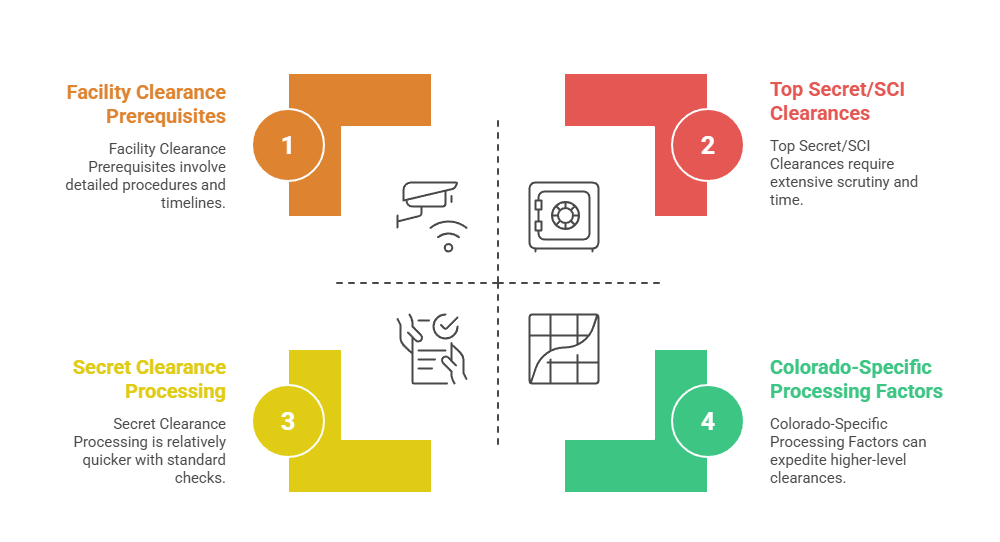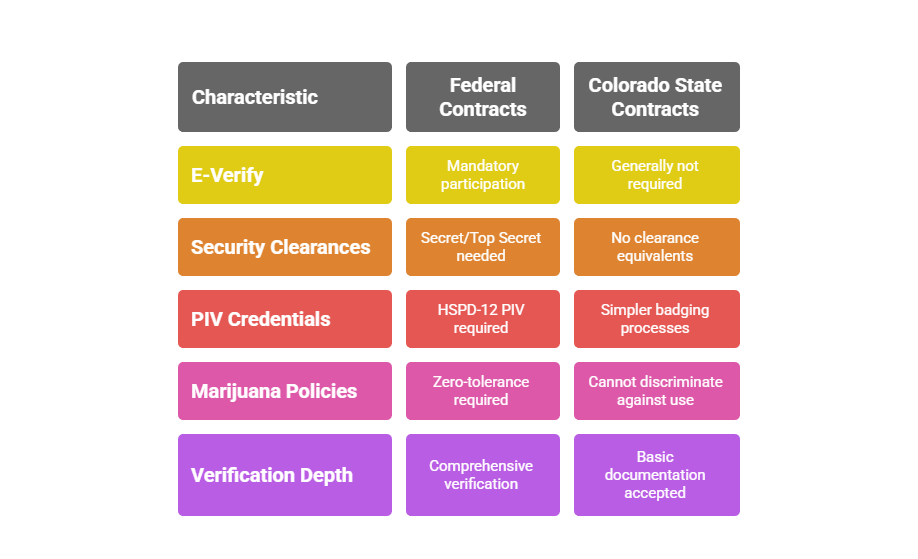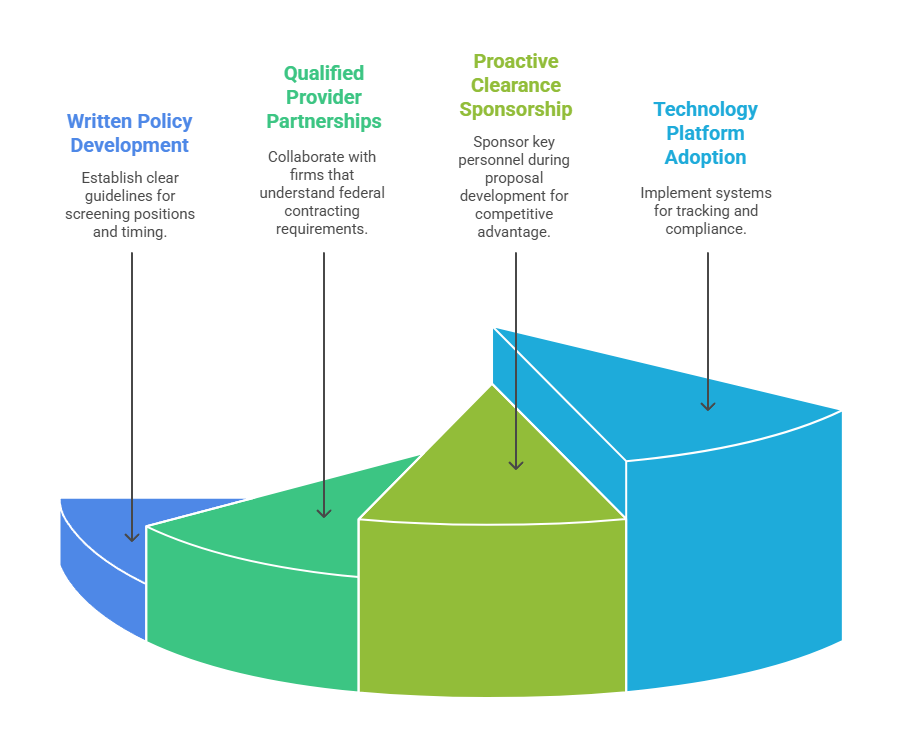Colorado's $11.7 billion federal contracting ecosystem demands specialized background screening protocols. Peterson Space Force Base, Buckley Space Force Base, and Fort Carson anchor this system. Government contractors operating in Colorado's defense technology corridor must navigate complex verification processes. These extend beyond standard employment checks to include security clearance investigations, DCAA audit readiness, and facility clearance maintenance for classified contract work.
Key Takeaways
- Colorado government contractors must comply with FAR 52.204-9 requirements mandating E-Verify participation and specific criminal background checks for employees working on federal contracts.
- Defense contractors supporting Peterson SFB and Buckley SFB facilities require specialized screening processes addressing security clearance sponsorship timelines averaging 180-270 days for Secret clearances.
- The state's $8.2 billion defense contracting sector encompasses over 2,400 companies requiring continuous personnel screening for DCAA compliance and facility security clearance maintenance.
- Colorado Springs ranks as the nation's third-largest military installation complex, creating unique background screening demands for contractors supporting Space Force, Army, and Air Force operations simultaneously.
- State-specific considerations include Colorado's ban-the-box legislation (effective 2021) and marijuana legalization conflicts with federal drug-free workplace requirements under FAR provisions.
- Small business contractors entering the federal marketplace must establish baseline screening infrastructure including Facility Security Officer designation and insider threat program implementation before receiving classified contract awards.
- Background check turnaround times significantly impact contract performance timelines, with county-level criminal searches in El Paso and Arapahoe counties averaging 3-7 business days versus instant national database checks.
- Emerging Space Force contractors face evolving screening requirements tied to Orbital Warfare, Space Electronic Warfare, and Space Battle Management systems requiring enhanced personnel reliability standards.
Understanding Colorado's Federal Contracting Background Check Landscape
Colorado serves as home to U.S. Space Command headquarters and two Space Force bases. This creates a complex background screening environment where traditional government contracting requirements intersect with evolving aerospace defense protocols. The state's federal contracting economy employs over 92,000 workers directly, with contractors ranging from established defense giants like Lockheed Martin to emerging technology startups securing SBIR contracts.
Federal acquisition regulations, defense-specific security requirements, and Colorado state employment laws create a three-dimensional compliance framework. The CAGE code registration process represents just the initial step for contractors pursuing federal work. Beyond basic registration, contractors must implement personnel screening systems addressing FAR mandatory disclosure requirements, DFARS cybersecurity provisions, and NISPOM stipulations for classified work.
Colorado's concentration of Space Force installations adds another layer of complexity for screening operations. Denver's emergence as a government technology hub—with federal agencies like GSA, NASA, and NOAA maintaining significant operations—diversifies requirements beyond purely defense-focused checks. Colorado-based screening providers must maintain expertise across military security clearances, public trust positions, and standard FAR compliance verifications simultaneously.
Mandatory Federal Background Check Requirements for Colorado Contractors

Federal contractors in Colorado face several critical screening mandates established through FAR clauses and presidential directives. These requirements affect personnel management, facility access, and contract compliance across all federal projects. Understanding each component helps contractors maintain compliance, avoid staffing delays, and prevent costly contract performance issues.
FAR 52.204-9 Personal Identity Verification Standards
Federal contractors must comply with HSPD-12 requirements implemented through FAR clause 52.204-9. This mandates personal identity verification for all employees accessing federal facilities or information systems. The requirement affects every contractor employee entering Peterson Space Force Base, Buckley Space Force Base, Fort Carson, or federal office buildings throughout Colorado's Front Range corridor.
| Verification Component | Timeline | Scope Covered |
| FBI Fingerprint Check | 24-72 hours | National criminal records |
| National Agency Check | 14-30 days | Federal database queries, credit check |
| Residence Verification | 21-45 days | Physical address confirmation for 5-year period |
| Employment History | 30-60 days | Direct employer contact for 5-year employment |
PIV processing timelines average 45-90 days from investigation initiation to credential issuance. DCMA offices in Colorado enforce strict badging requirements, refusing base access to contractor personnel lacking completed PIV credentials regardless of contract urgency or customer pressure.
E-Verify and Employment Eligibility Requirements
All Colorado government contractors must participate in E-Verify under FAR 52.222-54. This mandates electronic verification of employee work authorization status for all new hires working on federal contracts. The requirement extends beyond employees directly assigned to federal projects when gross revenue from federal contracts exceeds $6.5 million annually.
Contractors must enroll in E-Verify within 30 days of contract award and verify all employees hired during the contract period within three business days. Colorado's diverse workforce—including significant populations of foreign nationals employed in aerospace engineering and technical roles—makes E-Verify compliance particularly critical. DCAA auditors specifically review E-Verify compliance during contractor purchasing system reviews, with documentation deficiencies potentially leading to withholding of contract payments.
Drug-Free Workplace Requirements and Colorado-Specific Conflicts
Federal contractors must establish drug-free workplace programs under the Drug-Free Workplace Act of 1988, implemented through FAR 52.223-6. This creates direct conflicts with Colorado's marijuana legalization framework established in 2012. While Colorado law permits recreational marijuana use, federal contracts prohibit contractors from employing individuals using controlled substances—including marijuana—regardless of state legalization status.
Pre-employment drug screening for Colorado government contractor positions must test for marijuana in addition to other controlled substances. Security clearance investigations specifically inquire about marijuana use, with recent usage potentially disqualifying applicants from clearance eligibility. Contractors supporting Space Force operations face particular scrutiny, with positions involving access to launch operations, satellite control systems, or space weapons platforms maintaining zero-tolerance policies for any controlled substance use.
Colorado Defense Contractor Security Clearance Requirements
Colorado's concentration of classified military installations makes security clearance processing central to defense contractor operations. Peterson Space Force Base and Buckley Space Force Base host classified space operations requiring contractor personnel to hold Secret or Top Secret clearances. Cheyenne Mountain serves as a backup command center maintaining highly sensitive operations requiring the most stringent personnel vetting standards.

The security clearance process begins with facility clearance establishment, as contractors must obtain facility clearance before sponsoring individual employees for security clearances. This involves designating a Facility Security Officer (FSO), implementing security procedures addressing classified material handling, and passing DCSA inspections. Colorado contractors new to classified work often face 6-12 month timelines from initial facility clearance application to first employee clearance sponsorship capability.
Secret Clearance Processing for Space Force Contractors
Secret clearance represents the most common clearance level for Colorado Springs defense contractor background checks. Approximately 60% of classified positions supporting Peterson Space Force Base operations require Secret clearance as the minimum eligibility standard. The investigation involves a Standard Form 86 (SF-86) questionnaire documenting 10 years of personal history, including residences, employment, education, foreign contacts, and financial information.
Current Secret clearance processing timelines through DCSA average 180-270 days from investigation initiation to adjudication completion. This represents significant improvement from 2018-2019 backlogs when Secret clearances took 400+ days. The investigation includes comprehensive criminal record checks at federal, state, and county levels for all locations where the applicant has lived, worked, or attended school during the 10-year period, with credit checks examining financial responsibility and susceptibility to foreign influence.
Top Secret/SCI Clearances for Specialized Space Operations
Top Secret clearances with SCI access represent the highest tier for most Colorado defense contractors. These clearances enable access to space intelligence systems, overhead reconnaissance programs, and missile warning operations. Approximately 15-20% of Peterson Space Force Base contractor positions require TS/SCI clearance, with investigations typically requiring 12-18 months for completion.
The investigation scope expands to comprehensive field interviews where investigators conduct in-person discussions with references, former supervisors, neighbors, and associates. Financial records undergo detailed examination, and foreign connections receive enhanced scrutiny. Polygraph examinations may be required for certain SCI programs, particularly those involving space-based reconnaissance or signals intelligence, with counterintelligence-scope polygraphs (CI poly) being most common.
DCAA Compliance and Contractor Personnel Screening
Ensuring DCAA compliance is a critical part of background screening for Colorado federal contractors. Auditors from the Defense Contract Audit Agency (DCAA) evaluate a company’s business systems to verify adherence to Federal Acquisition Regulation (FAR) requirements and cost accounting standards. This process helps confirm that contractors maintain transparency and financial integrity in federal projects. Personnel screening documentation falls under DCAA scrutiny during contractor purchasing system reviews, estimating system audits, and incurred cost audits.
DCAA auditors examine whether contractors maintain adequate documentation of employee eligibility verification, credential validation, and skills verification. For labor categories specified in government contracts, contractors must demonstrate that assigned personnel actually possess the education, certifications, and experience levels claimed in proposals. Inadequate documentation can result in questioned costs, disapproved business systems, and contract payment withholding.
Colorado's concentration of cost-plus research and development contracts—particularly those supporting Space Force technology development and SBIR programs—intensifies DCAA scrutiny of personnel qualifications. Contractors must maintain organized personnel files documenting background check completion, credential verification, and skills validation. Education verification should include direct confirmation with degree-granting institutions, while professional certifications require validation of current, active status.
Colorado State and Federal Contractor Screening Differences
Colorado contractors operating in both state and federal markets face distinct compliance requirements that require careful navigation. Understanding these differences prevents gaps when working on both project types simultaneously. The following comparison highlights key screening variations contractors must address when pursuing state versus federal government work in Colorado's diverse public sector marketplace.
State of Colorado procurement operates under different regulations than federal acquisition, with the Colorado Governmental Immunity Act and state procurement rules creating separate frameworks. State contractor screening typically involves less intensive background checks than federal contracts, with Colorado state agencies commonly requiring basic criminal background checks for contractors working in sensitive environments like correctional facilities or healthcare settings.
Key differences between state and federal contractor screening include:

- E-Verify Requirements: Federal contracts mandate E-Verify participation under FAR 52.222-54, while Colorado state contracts generally don't require E-Verify enrollment
- Security Clearances: Federal contracts may require Secret or Top Secret clearances for classified work, while Colorado state contracts have no clearance equivalents
- PIV Credentials: Federal facility access requires HSPD-12 PIV credentials based on NACI investigations, while state facility access uses simpler badging processes
- Marijuana Policies: Federal contractors must maintain zero-tolerance marijuana policies under Drug-Free Workplace Act requirements, while Colorado state agencies cannot discriminate against lawful marijuana use
- Depth of Verification: Federal contracts require comprehensive employment and education verification with direct source confirmation, while state contracts often accept self-reported information with basic documentation
Contractors working both state and federal projects must maintain separate personnel policies addressing these conflicts appropriately. FAR clauses create uniform mandates across Department of Defense, civilian agencies, and intelligence community contracts, while state contracts allow individual agencies considerable flexibility in setting contractor screening requirements.
Best Practices for Colorado Federal Contractor Background Check Programs
Implementing effective background screening programs requires strategic planning and systematic execution across all personnel management functions. Colorado government contractors should establish comprehensive policies addressing all personnel verification aspects from initial candidate screening through ongoing employee monitoring. These best practices help contractors maintain compliance while managing costs and timelines effectively in Colorado's competitive federal marketplace.
Core elements of successful contractor screening programs include:

- Written Policy Development: Document exactly which positions require which screening levels, establish position sensitivity designations that align with contract requirements, define timing for screening in the hiring process and frequency of ongoing checks, and create clear documentation to protect contractors during DCAA audits
- Qualified Provider Partnerships: Partner with background check firms that understand federal contracting requirements, ensure providers demonstrate FCRA compliance experience and conduct county-level criminal searches efficiently, verify providers offer audit-ready documentation and technology platforms with real-time status visibility
- Proactive Clearance Sponsorship: Sponsor key personnel during proposal development rather than waiting until contract award, accept calculated financial risk for high-probability opportunities to gain competitive advantage, dramatically reduce time-to-productivity when contracts are awarded
- Technology Platform Adoption: Implement applicant tracking systems that integrate background check ordering and status tracking, deploy systems that generate audit trails demonstrating compliance with verification requirements, utilize electronic I-9 systems with integrated E-Verify submission to reduce manual workload
These systematic approaches transform compliance from administrative burden into competitive advantage. The initial investment in screening infrastructure and technology platforms typically pays for itself through improved efficiency, reduced audit findings, and faster contract startup capabilities.
Small Business Contractors and Background Check Requirements
Small business contractors face unique challenges navigating Colorado federal contracting compliance background checks due to limited resources. Limited HR infrastructure, tight budgets, and steep learning curves can make compliance seem overwhelming for companies new to government work. However, strategic approaches enable small businesses to compete effectively while meeting all screening requirements without overwhelming their operational capacity.
Understanding contract requirements represents the critical first step for small businesses entering the federal marketplace. Not every federal contract requires security clearances, and not every position needs a PIV credential. Small businesses should carefully analyze contract clauses to identify actual requirements, with FAR 52.204-9 indicating PIV requirements and FAR 52.222-54 indicating E-Verify mandates. Starting with clear requirement identification prevents unnecessary screening costs while ensuring essential verifications occur.
Small businesses pursuing classified work must establish facility clearances before sponsoring employee clearances through a multi-step process. First, obtain a CAGE Code through SAM.gov registration. Second, appoint a qualified FSO who completes required training. Third, implement written security procedures addressing classified material handling. Fourth, submit SF-328 through NBIS requesting the needed facility clearance level. Finally, pass initial DCSA security inspection demonstrating adequate physical security. This entire process typically requires 6-12 months and costs $15,000-$30,000 when accounting for physical security improvements, FSO training, and administrative processing.
Conclusion
Colorado government contractor background checks require comprehensive understanding of multiple regulatory frameworks. Federal regulations, defense-specific security requirements, and state law considerations create complex compliance demands. The intersection of Colorado's $11.7 billion federal contracting economy with its Space Force installations creates unique screening challenges. Contractors must balance FAR compliance mandates, security clearance timelines, and DCAA documentation standards. Success requires strategic investment in screening infrastructure and knowledgeable personnel. By implementing best practices, Colorado contractors can maintain competitive advantages while ensuring full compliance.
Frequently Asked Questions
How long does a Secret clearance take for Colorado defense contractors?
Secret clearance processing through DCSA currently averages 180-270 days. This timeline assumes straightforward cases without complicating factors. Foreign contacts, financial problems, or documentation gaps can extend processing significantly. Colorado contractors should plan staffing timelines accordingly and consider interim clearance possibilities.
Does Colorado marijuana legalization affect federal contractor employment?
Federal drug-free workplace requirements supersede state marijuana legalization. FAR 52.223-6 requires contractors to maintain programs prohibiting marijuana use regardless of Colorado state law. Security clearance investigations examine marijuana use. Recent usage can result in clearance denial. Colorado contractors must enforce federal standards.
What background checks are required for Peterson Space Force Base contractor access?
Peterson SFB access requires at minimum a HSPD-12 PIV credential. This is based on a completed NACI investigation. The investigation involves FBI fingerprint checks and national agency record checks. For classified work, Secret or Top Secret clearances are required depending on contract sensitivity.
How do DCAA audits examine contractor background check compliance?
DCAA auditors review personnel screening documentation during contractor purchasing system reviews. They verify adequate documentation of employee eligibility verification and credential validation. Auditors examine whether education credentials are confirmed with degree-granting institutions. They verify professional certifications and employment history. Inadequate documentation can result in questioned costs.
What is the difference between state and federal contractor screening in Colorado?
Federal contractors must comply with FAR requirements including E-Verify participation and PIV credentials. Colorado state contracts typically involve less intensive screening. Federal contractors must enforce zero-tolerance marijuana policies. State contractors cannot discriminate against lawful marijuana use. Contractors working both project types must maintain separate policies.
Do small businesses need facility clearances before bidding on classified contracts?
Facility clearance is not required to bid on classified contracts. However, contractors must possess or be able to obtain facility clearance before receiving awards. The facility clearance process takes 6-12 months. Small businesses should initiate the process during proposal development for high-probability opportunities.
How does continuous vetting affect cleared contractor employees?
Continuous vetting programs monitor cleared personnel through automated record checks. These include criminal databases, financial records, and government systems. Concerning information triggers real-time security reviews. Cleared employees should maintain awareness that financial problems or legal issues may trigger reviews. Contractors should educate employees about continuous monitoring.
What credentials are needed for Space Force contractor positions?
Requirements vary by position and contract. Unclassified positions typically require PIV credentials. Classified positions require Secret or Top Secret clearances depending on information accessed. Some specialized positions may require SCI access with counterintelligence polygraph. Emerging Space Force operations may implement additional reliability assessments beyond traditional clearance requirements.
Additional Resources
- Defense Counterintelligence and Security Agency - Personnel Security
https://www.dcsa.mil/is/personnel-security/ - Federal Acquisition Regulation (FAR) - Official Resource
https://www.acquisition.gov/browse/index/far - National Industrial Security Program Operating Manual (NISPOM)
https://www.dcsa.mil/is/nispom/ - Defense Contract Management Agency - Contractor Resources
https://www.dcma.mil/ - Colorado Procurement Technical Assistance Center
https://choosecolorado.com/programs-initiatives/ptac/
Still have questions?
Get in touch with our team today for a personalized demo and discover how our tailored volume pricing and packages can drive results for your business!
How useful was this page?*
Note: your comments are anonymous. We use them to improve the website. Do not include any personal details.
Visit our FCRA Compliance Tool or leave a message here if you need a response.
From the blog Explore the GCheck Content Hub

Healthcare Background Check Requirements by State: A 2026 Operational Guide
14 Jan, 2026 • 18 min read
DUI Employment Restrictions by Industry: Complete 2026 Guide
14 Jan, 2026 • 19 min read
Financial Sector Background Checks: Navigating the 2026 Screening Landscape
13 Jan, 2026 • 18 min readThe information provided in this article is for general informational and educational purposes only and should not be construed as legal advice or a substitute for consultation with qualified legal counsel. While we strive to ensure accuracy, employment screening laws and regulations—including but not limited to the Fair Credit Reporting Act (FCRA), Equal Employment Opportunity Commission (EEOC) guidelines, state and local ban-the-box laws, industry-specific requirements, and other applicable federal, state, and local statutes—are subject to frequent changes, varying interpretations, and jurisdiction-specific applications that may affect their implementation in your organization. Employers and screening decision-makers are solely responsible for ensuring their background check policies, procedures, and practices comply with all applicable laws and regulations relevant to their specific industry, location, and circumstances. We strongly recommend consulting with qualified employment law attorneys and compliance professionals before making hiring, tenant screening, or other decisions based on background check information.

